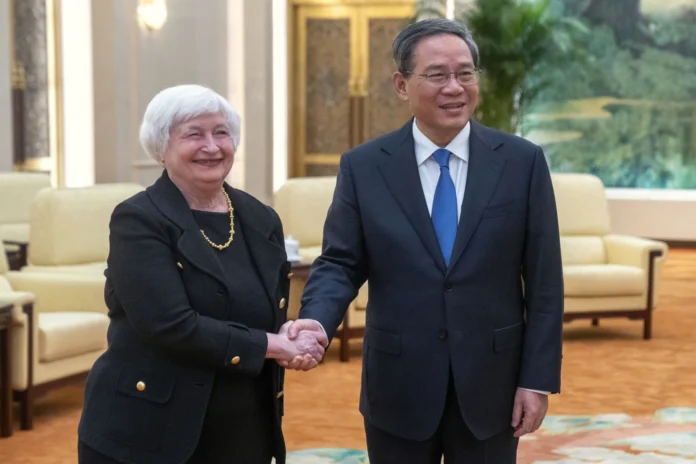Beijing, China (Reuters) – On Friday, Treasury Secretary Janet Yellen met with Premier Li Qiang of China to address the escalating tensions between the United States and China regarding access to processor chips and advanced technology. Yellen appealed to the Chinese government not to let frustrations hinder economic cooperation and emphasized the importance of regular communication to alleviate misunderstandings.
Yellen, along with several other senior U.S. officials, embarked on a visit to Beijing to encourage the revival of government interactions between the world’s two largest economies. Although no breakthroughs were expected and Yellen did not meet with Chinese leader Xi Jinping, her objective was to bridge the gap and heal the rifts caused by a multitude of antagonistic issues between the two nations.
During the meeting, Yellen defended the “targeted actions” implemented by the U.S., such as restrictions on Chinese access to advanced processor chips and technology, citing national security concerns as the primary motivation. However, she stressed the need to avoid misunderstandings that could unnecessarily worsen economic and financial relations between the two countries.
Calling for “healthy economic competition,” Yellen stressed the need to create fair rules that benefit both the United States and China. She stressed that both countries have an obligation to cooperate on important global issues.
Li expressed optimism about possible improvements, but did not mention possible changes in China policy that would anger the United States and its trading partners. He made a metaphorical reference to the rainbow that appeared after Yellen’s plane landed in Beijing, suggesting a brighter day might come. China’s Ministry of Finance said Yellen’s visit was a “concrete step” to implement a November agreement between Xi Jinping and President Joe Biden aimed at improving relations.
The ministry stressed that there are no winners in the trade war and “broken chains” and urged Washington to take the first step. Leaders called on the United States to take concrete actions to create an environment conducive to sound economic and trade relations.
US restrictions on access to Chinese technology pose a significant threat to the ruling Communist Party’s plans to develop key areas such as telecommunications and artificial intelligence. Chinese President Xi Jinping has previously accused the United States of trying to hinder China’s progress in these areas.
Beijing has been wary of retaliating, but recently announced export restrictions on gallium and germanium, metals essential to semiconductors and solar panels. The move surprised countries like South Korea, which rely heavily on imports from China.
Ms Yellen met with businessmen and criticized China’s treatment of US companies before meeting Li. He expressed concern about China’s use of non-market instruments, such as increased subsidies for state-owned enterprises and barriers to market entry for foreign firms. Yellen reiterated that the United States is not seeking complete decoupling of the two economies, stressing the destabilizing impact of such decoupling on the global economy.
Yellen’s visit to China follows a meeting last month between Foreign Minister Antony Brinken and Chinese leader Xi Jinping. The two sides agreed to stabilize relations, but failed to reach an agreement on improving communication between the militaries. Recent tensions have been exacerbated by President Joe Biden calling Xi Jinping a dictator.
Despite protests from the Chinese government, Mr Biden said he would not make any major changes to his public statements.
In the coming week, John Kerry, the U.S. climate envoy, is scheduled to visit China. As the world’s top emitters of climate-changing carbon, both countries’ actions are crucial in addressing climate change.
Yellen’s visit and the subsequent visits by U.S. officials reflect the ongoing efforts to mend relations between the United States and China. The goal is to find common ground and establish open lines of communication to resolve economic and technological disputes, ultimately benefiting both nations and the global economy.






